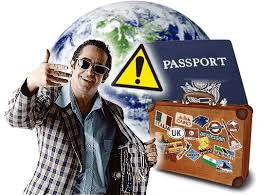
Avoiding Travel Scams
Avoiding Travel Scams
Traveling is part of the gay lifestyle. It is so great to leave your cares behind and enjoy a new culture and to meet new people. But travel scams are becoming much more common, and potential gay travelers need to become more wary of them .
Here are ten things you really need to know to avoid getting taken by travel scams:
1. If you are offered a travel deal by email, it’s generally a scam. If the email also has a language that seems suspicious due to the words like my dear ” sir ” and grammar and spelling errors and the writing flow is distorted or broken …it is a red flag.
If you are offered the travel deal by phone, be very skeptical. If you’re unfamiliar with the company, get its name, address, and local telephone number. Find a legitimate local or regional office for the company and directly contact them yourself. Don’t have someone from their office contact you.
2. “If it sounds too good to be true…” Who wouldn’t want a 100% paid free trip to Bali and to share it with a special somebody. If it’s too good to be true, it really is .
Listen for the details — or read the ‘fine print.’
In most scams the airfare is free, but will have a clause in the contract that says you must stay in specific accommodations . Read the small print. It is in there. You may need a magnify glass but it is there!
I have actually got the scam where they said I won a contest; however, I did not remember signing up for it . If the agent claims you’ve won a contest, get more details. Find out the rules and regulations because by law they are supposed to have them. If you entered, tell them to show you the ballot. If you didn’t enter, you didn’t win anything. You’ll just be asked to pay lots of fees which should not cost anything if you won a prize. You may get a 1099 at the end of the year but that should be it .
3. Never give your credit card number over the phone unless you made the phone call and you know that you’re dealing with a reputable company. I would advise not giving out a debit card number connected to your checking account. A credit card would be better (so that you can dispute the charge if it turns out you’ve been scammed) . And you should never have to disclose any other personal details, like your social security number.
4. If you think you are interested in the offer, always ask what’s NOT included: You will be expected to pay for ‘service charges,’ ‘processing fees,’ and taxes are typically added on after the fact .
Ask for specific details, too. Many travel scams are based on really very vague information — for example, using the phrase ” major airline” is very broad. It’s not specific at all.
5. Know that you can only dispute credit card charges within 60 days of acquiring them. So while it’s a good idea not to use your debit card, you will only have time to dispute a charge with your credit card for usually 60 days. If the trip is longer than 60 days away, guess what? You will not be able to dispute it and they know it.
6. Never dial a 900 number to reach a travel agency or club. No legitimate company requires you to pay for a 900 call to phone their customer service desk.
Also, beware of calling numbers with 809, 758, or 664 area codes. Google the number or area code. I have goggled phone numbers and there are folks who actually post Beware and Scam next to it which is very helpful. Definitely Google the phone number.
7. Make sure you get copies of everything — for example, your receipts, your itinerary, and the company’s cancellation and refund policies. Everything will be available with reputable companies. If they don’t know the itinerary yet, that should be a major red flag. An experienced company will already have itineraries for you to look at . Most companies have the agenda a year planned out or more.
8. Don’t give in to high pressure tactics. They may use lines like, “Today is the last day of the sale” or “We only have 2 slots left and you may lose out .” I am sure that there will be more sales and more opportunities.
You want to have time to check into the background of the company making the offer. They should want you to check them .
9. Don’t ever make a payment before you receive all the information — or even worse, some travel scams require you to pay to get the information.
Legitimate travel businesses will make sure you have all the details before you have to pay for anything. Everything should be already planned out if it is a tour. usually they do not require 100% , just a small percentage to secure your place.
10. Ask for references — and contact them. Google the company as well. Contact some Watch Dogs groups that monitor that particular industry. You do not want to just rely on the references , they gave you . Go to the BBB website.
These tips should keep you from being taken by travel scams in the future. If you think you may have already been scammed in the past, your state Consumer Dept. or Attorney General may be able to help. If you have been scammed in the past, do not get discouraged but learn from it and keep on aging forward with resiliency and strength.
Feel free to write comments or add to the list below in the reply box.






2 Comments